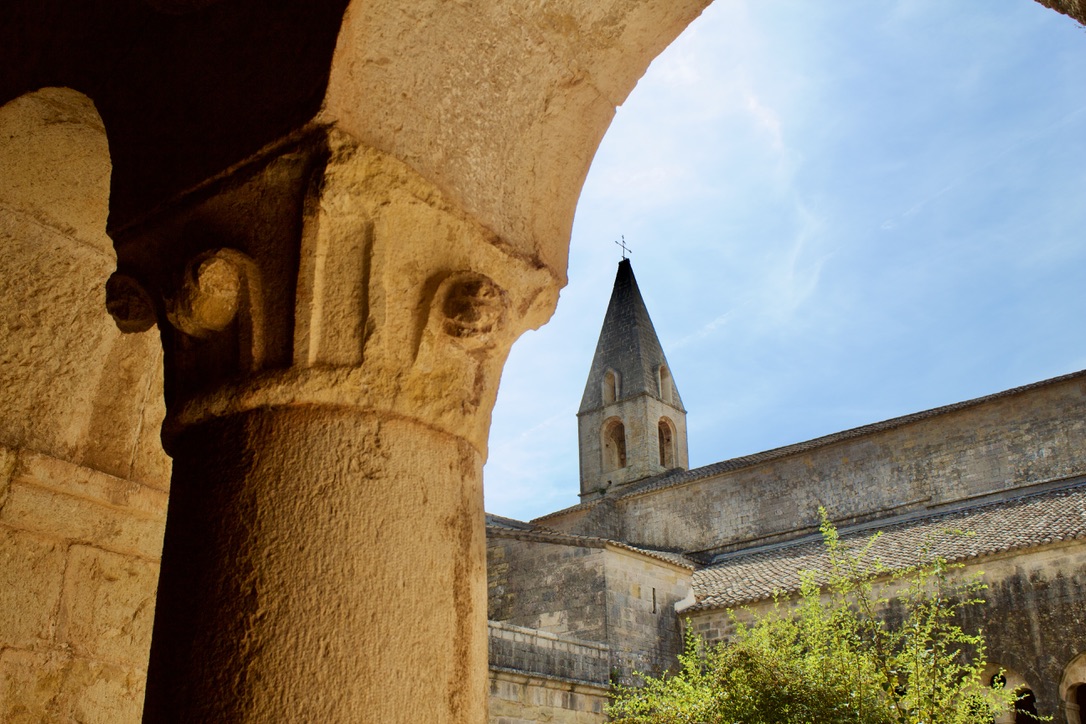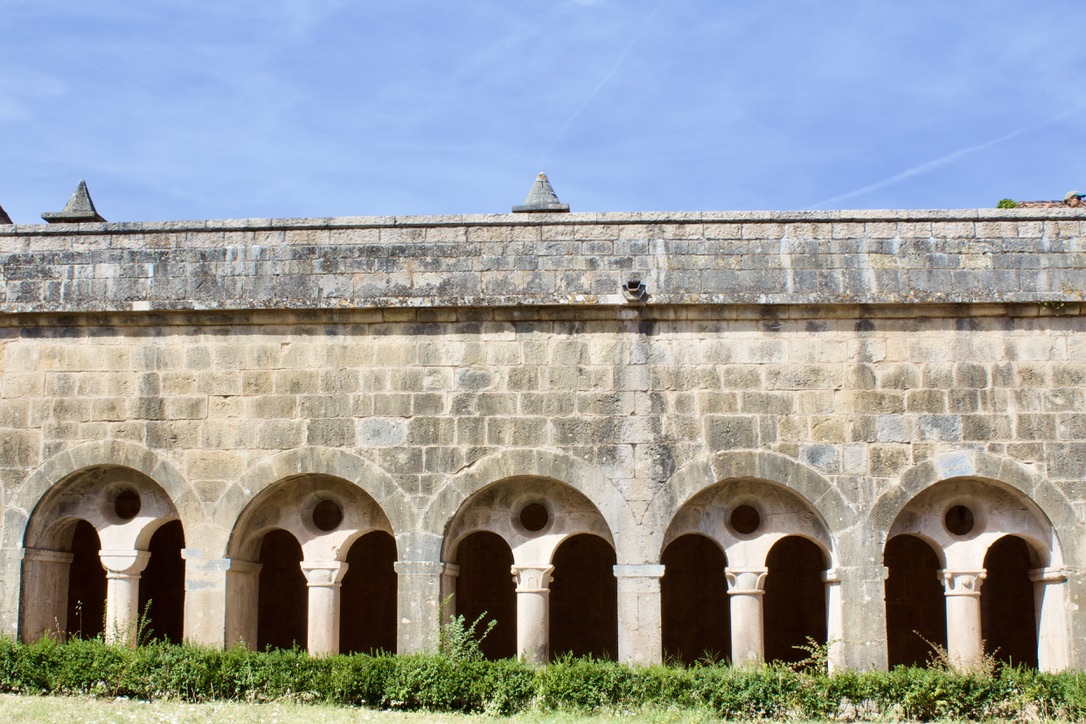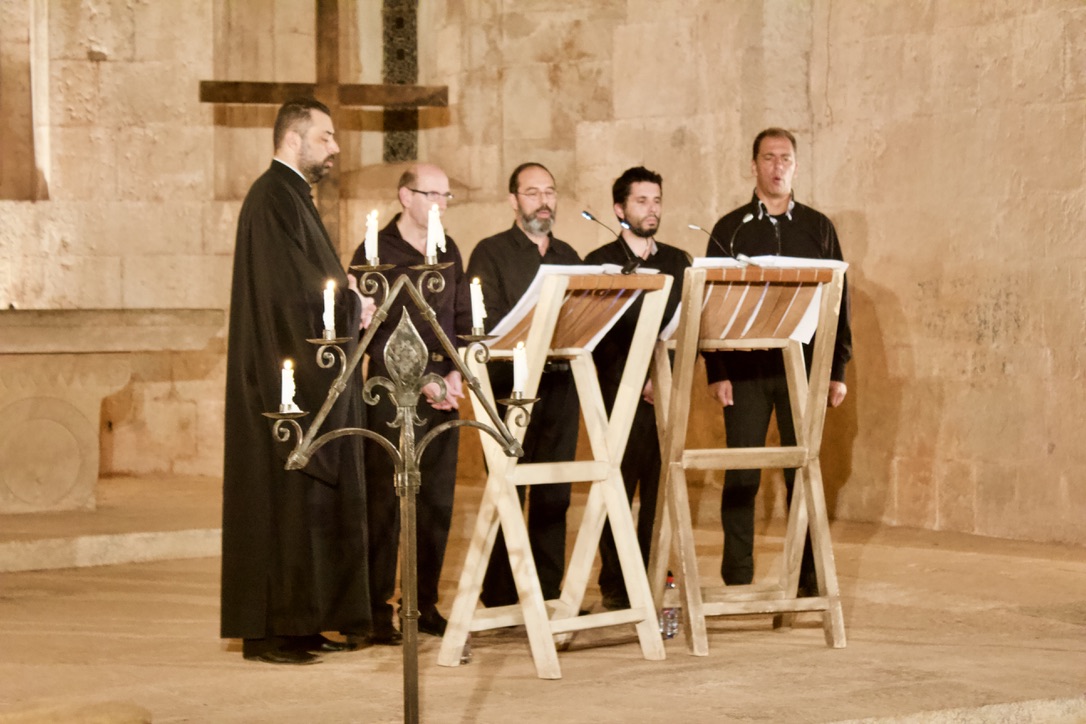ABBEY OF THORONET - ESSENCE OF CISTERCIAN ART
Situated in the town Thoronet, this Cistercian Abbey was founded in 12th century. The Abbey of Thoronet (*) is one of three Provencal abbeys built in the Cistercian style during the Romanesque period. It was designated an "Historic Monument" in 1840.

HISTORY OF ABBEY
The complex was built between the years 1150 and 1200 AD. The main buildings of the abbey, its church, including sacristy cabinets, chapter house, and cloister were built between 1150 and 1175. In 1175, the tenants added a sink and pantry to the kitchen as well. The courtyard and a dormitory for lay brothers were built around 1200. The buildings were built from cut stones which were set without mortar.
The Abbey of Thoronet expresses the essence of Cistercian art: perfection was to be found in simplicity and harmony in rigor, notions that were inspired by the philosophy of Saint Bernard.
The Cistercian architectural style is characterized by clean lines, simple design, and elegance intended to convey to the observer feelings of harmony and serenity.

The abbey nearly disappeared due to centuries of neglect. Its acquisition by the state in 1854, and intervention of the writer Prosper Mérimée, marked a turning point in its history. Its first restoration was undertaken by the architect Revoil in 1873, followed by another effort initiated by Formigé beginning in 1907. Restoration works continues to this day.
Note: (*) Three Provençal abbeys were designed and constructed in the Cistercian Romanesque style: Abbey Thoronet, Abbey of Our Lady of Sénanque, located on the town of Gordes, Vaucluse department, and Abbey Silvacane, in the town of Roque-d'Anthéron, in the department of Bouches-du-Rhône.
MONASTIC LIFE AT THE ABBEY OF THORONET
The establishment of the Abbey of Thoronet was rooted to the expansion of the Cistercian Order during the 12th century. At that time, many faithful were seeking "new ways to find religious inspiration." Many sought to pursue more disciplined ways of tending towards perfection by returning to the community’s original values and canons.
The Cistercian order was to promote asceticism, with strict liturgical discipline, and held hard work to be a cardinal virtue. Socially, the order acts as the guarantor of the development of intellectual fields, arts and spirituality. At the beginning of the 13th century, the Abbey of Thoronet housed as many as 20 monks and a few dozen lay brothers. About two centuries later, the abbey entered a period on decline. By 1790, there remained only seven monks inhabiting the abbey.
ECONOMIC LIFE AT THE ABBEY OF THORONET
The economy of the abbey until the middle of the 13th century was organized around agriculture and animal husbandry. The isolated lifestyle required by the doctrine of St. Benedict applied to the inhabitants of the Abbey of Thoronet. Lay brothers were responsible for the full economic development of the abbey’s agricultural lands: salt production at Marignane and at Hyères, fishing at Martiques, Hyères and Sainte-Maxime, and the production of meat products and skins through the breeding sheeps and goats.
GREGORIAN CONCERTS AND MUSIC FESTIVALS AT THE ABBEY OF THORONET
With exceptional acoustics, the Abbey of Thoronet invites visitors to experience unforgettable concerts featuring the music of the Middle Ages.

During the summer, the abbey hosts the "International Medieval Music Meetings ", the "Music and Spirit Festival", and Gregorian chant concerts by soloists and choirs.
Address: 83340, Thoronet, D79
WINE TASTING NEAR THE ABBEY OF THORONET
PROVENCAL WINES OF DOMAINE SAINT CROIX MANUELLE
Situated a very short distance from Abbey of Thoronet, Domaine Saint Croix Manual offers a varied selection of wines from Provence certified on AOP and on IGP VAR.
Among the wines, two are worthy of special mention: the red wine 100% Merlot and white wine 100% Chardonnay.
The 100% Merlot varietal wine is powerfully expressive, full-bodied, and fruity. It goes particularly well with roasted duck and beef carpaccio dishes.
The 100% Chardonnay varietal wine expresses gourmet silky notes of mango and citrus. Excellent as an aperitif. It goes well with fish, salads and desserts.
Addresse : Route de l'abbaye, le Thoronet, 83340
PROVENCAL WINES OF CHÂTEAU NESTUBY
The Château Nestuby, located 20 km from the Abbey of Thoronet, near the village of Cotignac, produces Provencal wines which are designated apellation Côtes de Provence and PGI VAR.
The wines produced by Château Nestuby, as part of the "Classic" line, are typical of the region of Provence, noteworthy for their power and finesse.
The wines produced by Château Nestuby, as part of the "Collection" line, are admirably expressive of local soil characteristics. Such wines are truly exceptional vintages which harmoniously combine freshness and elegance.
Among the wines tasted, two deserve special mention: the rosé wine from the "Collection" series and its white wine counterpart which is produced 100% from the Rolle varietal.
The "Collection" line’s rosé wine expresses a range of elegant aromas such as wild strawberries, underscored by great freshness and a spicy finish. Excellent as an aperitif, it delightfully accompanies poultry, pork, and fish dishes as well as fresh tossed salads.
The white wine produced 100% from the Rolle varietal is expressive and gives off pleasant hints of citrus. Characterized by its minerality, this wine is excellent as an aperitif and goes particularly well with seafood dishes and meals featuring, in particular, sea bass and other types of white fishes.
The shop is open between May 1st through October 30th: Tuesday through Saturday from 10:00 AM to 7:00 PM, Sundays and holidays from 10 :00 AM to 12:30 PM;
November 1st to April 30th: Tuesday through Saturday from 10:00 AM to 12 :00 PM and between 3:00 PM and 6:00 PM.
Address : 4540, route de Montfort, 83570 Cotignac
* Three Provençal abbeys were built in the Cistercian style of the Romanesque period: the abbey of Thoronet, located in the commune of Thoronet in the Var department, Notre-Dame de Senanque abbey, and the abbey of Silvacane, located in the commune of Roque-d'Anthéron, in the department of Bouches-du-Rhône.



